This post may contain affiliate links. Please read our disclosure policy.
Master how to chop parsley and your prep work for and garnishing of a ton of recipes will instantly speed up. It’s all in your knife moves. Parsley is the centerpiece of Lebanese tabbouleh salad and the base of Italian gremolata and South American chimichurri. Plus, it finishes everything from fish to stuffed grape leaves.
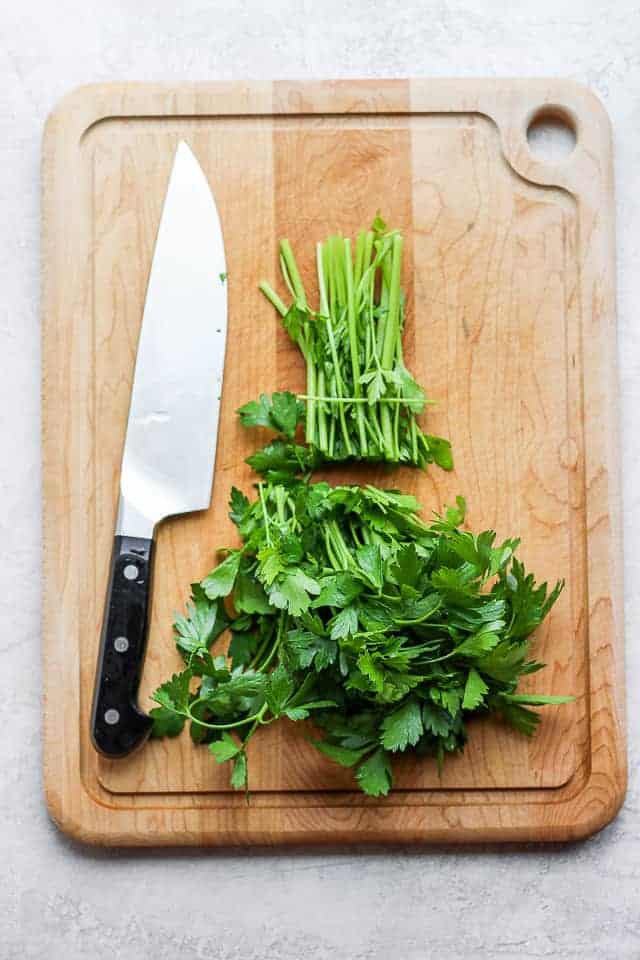
There are about 30 varieties of parsley – a relative of celery – but the two types commonly found in the produce aisle are curly parsley, and flat-leaf, aka Italian parsley. Italian is bolder in flavor and what is more common, but I opt for curly leaves for Lebanese dishes.
How do you clean parsley
Unless specifically labeled as pre-washed, you need to rinse away any bacteria, dirt, or chemical residual on fresh bunches of parsley. Here are my tips:
- Rinse under cold running water, shaking to make sure all leaves get washed.
- Or soak in a bowl of cold water and swish gently to remove dirt.
- If you are worried about bacteria, you can add white vinegar (two tablespoons for every one cup water) to the soak. Rinse afterward and keep in mind this can affect the taste.
- Remember, using bleach or other strong solutions to rinse produce can make you sick.
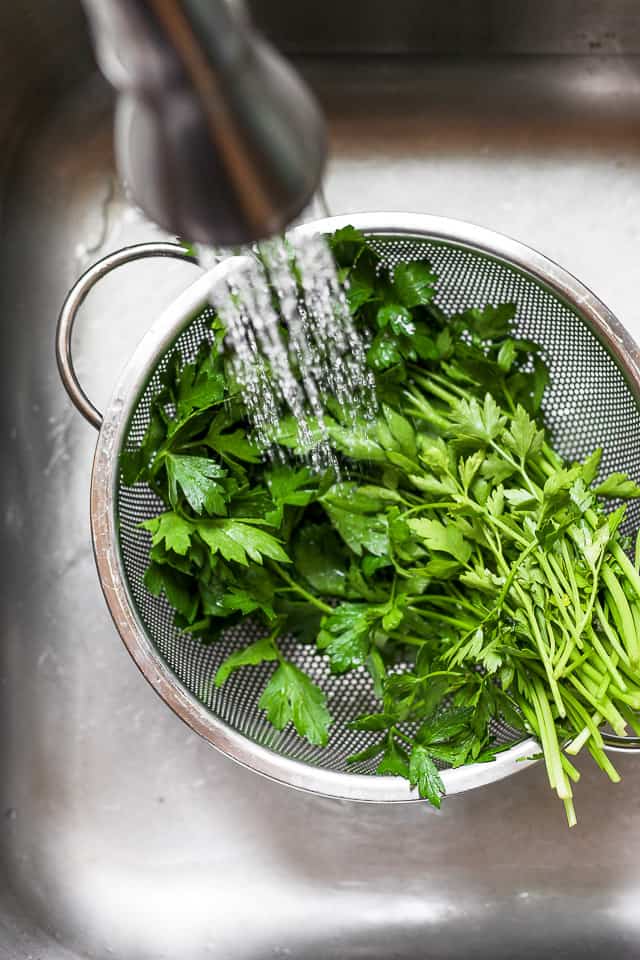
Next, dry the parsley by laying it on paper towels and blotting. Or spin in a salad spinner if you have one.
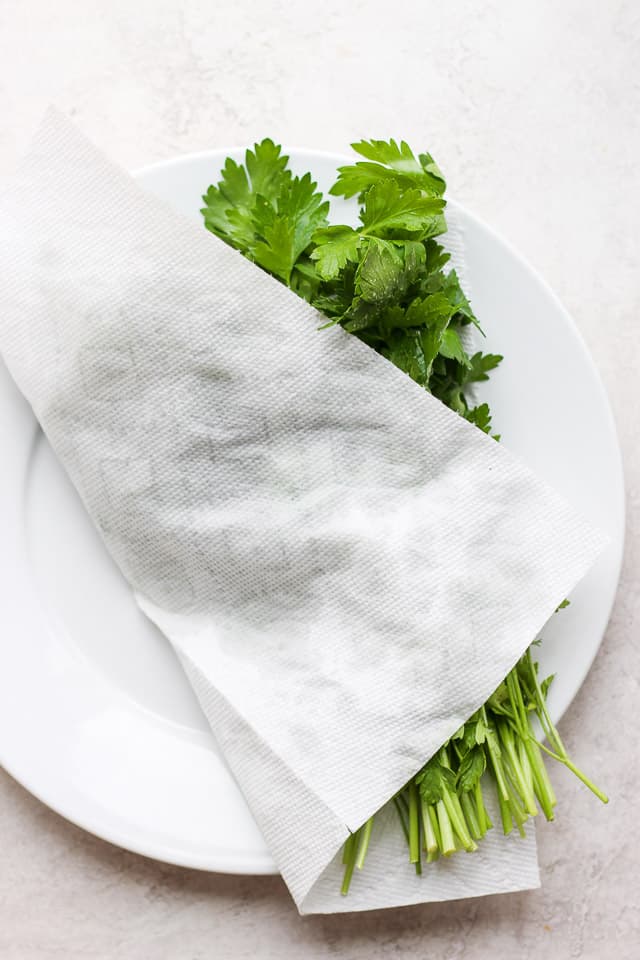
Decide how much parsley you want to use and store the remainder (storage tips below).
How to chop parsley
Now, take the parsley you’ll use in your recipe, line up the leaves together and use a sharp knife to cut off where the stems become thicker and larger.
Hold the knife in one hand, keep the tip of the knife on the cutting board and place the palm of your other hand on the top of the knife. Begin chopping the parsley with a fast up and down motion. Continue until the parsley is well chopped.
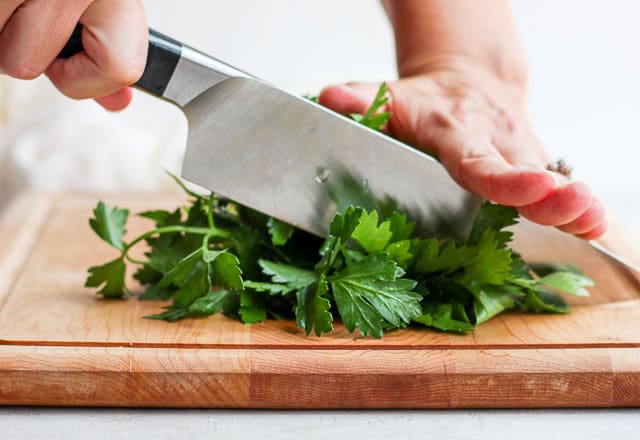
Tips for chopping parsley
- Be sure to rinse and lightly dry the chopped parsley. It will extend its shelf life in the refrigerator.
- Use the parsley stems to prevent browning other produce. If cleaning artichokes, apples, or anything that requires acidulated water to prevent browning, rough chop parsley stems and place them in water to replace lemons.
- Make your chopped parsley last longer by placing it in a paper towel and running water through it until the water runs clear. Squeeze the excess water out of the parsley and place on a dry paper towel and squeeze again to remove as much moisture as possible, let air dry for 10-15 minutes.
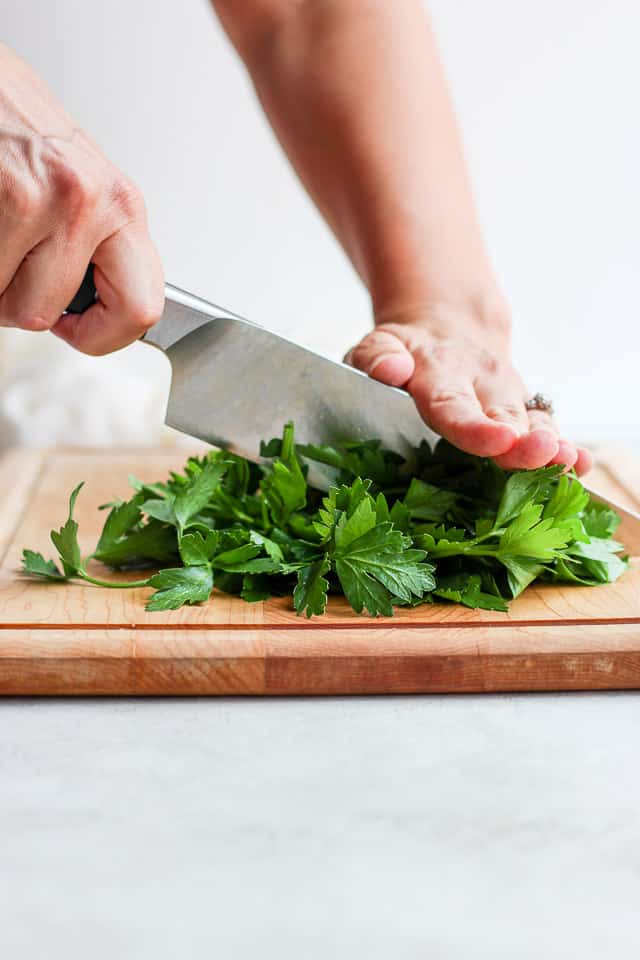
How do you store parsley?
For chopped parsley
- Line a container with a damp paper towel. Fill with chopped parsley and put a lid on it. This method keeps chopped parsley for up to five days. Otherwise, chopped parsley is best used within 24 hours.
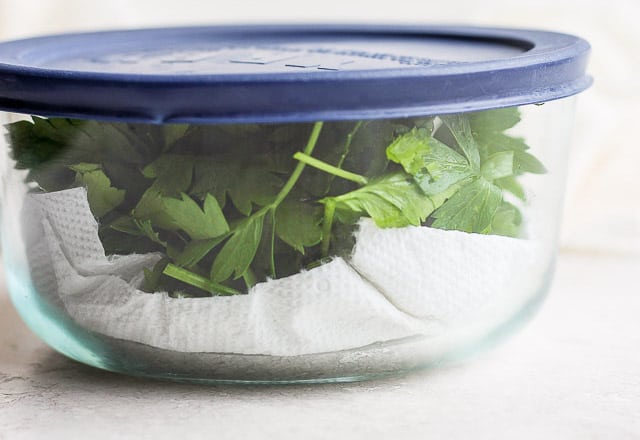
For whole parsley
Here are my favorite two storage methods depending on whether I’m using the parsley immediately or using it within a couple weeks.
- Storage Method 1: Wash the parsley and dry lightly. Then place like a bunch of flowers in a glass jar with the parsley stems down into the water. Cover the tops with a plastic or silicon bag. Place a rubber band around the bag to keep it in place. You can trim the bottom of the sticks and be sure to change out the water every 3-5 days. Store in the refrigerator for up to 2 weeks.
- Storage Method 2: Wash the parsley and dry lightly. Roll the parsley in a clean, damp (not wet!) paper towel, then roll the whole bundle into a plastic or silicon bag.
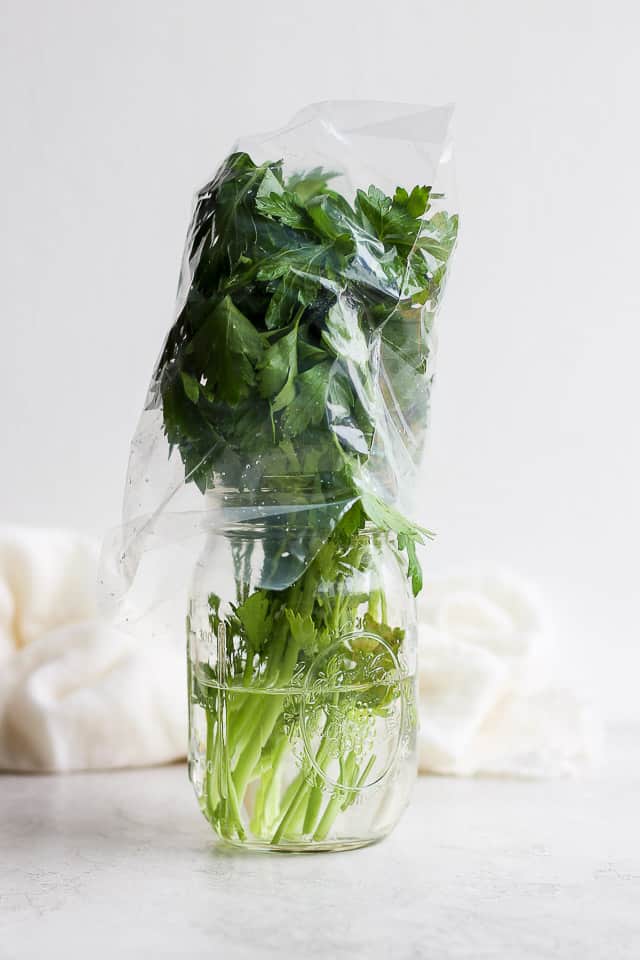
Recipes with parsley
- Lemon Parsley Baked Cod
- Lebanese Tabbouleh Salad
- Beef Kafta
- Lemon Herb Shrimp Stir Fry
- Healthy Tuna Salad
- Lebanese Crispy Falafel Recipe
- Easy Chicken Noodle Soup
- Garlic Lemon Tuna Pasta
- Vegetarian Stuffed Grape Leaves
- Lebanese Chicken Fatteh
- Grilled Eggplant
- Sheet Pan Salmon with Lemon and Garlic
- White Bean Salad
- Hummus with Ground Beef
- Chickpea Noodle Soup
Frequently asked questions
You can. But go lightly. I suggest drying the parsley well and using the pulse button to control your chop. You do not want to over-process and end up with green slime. But once you master a quick chop with a knife, you won’t want to have to clean your appliance for just a sprinkle of parsley.
In a pinch, sure, but remember curly parsley is not a flavorful as flat leaf.
You can set them aside (or freeze them) for another use like adding them into broths, beans, stews, or soups for flavor. Check out this article for all my tips for using herb scraps.
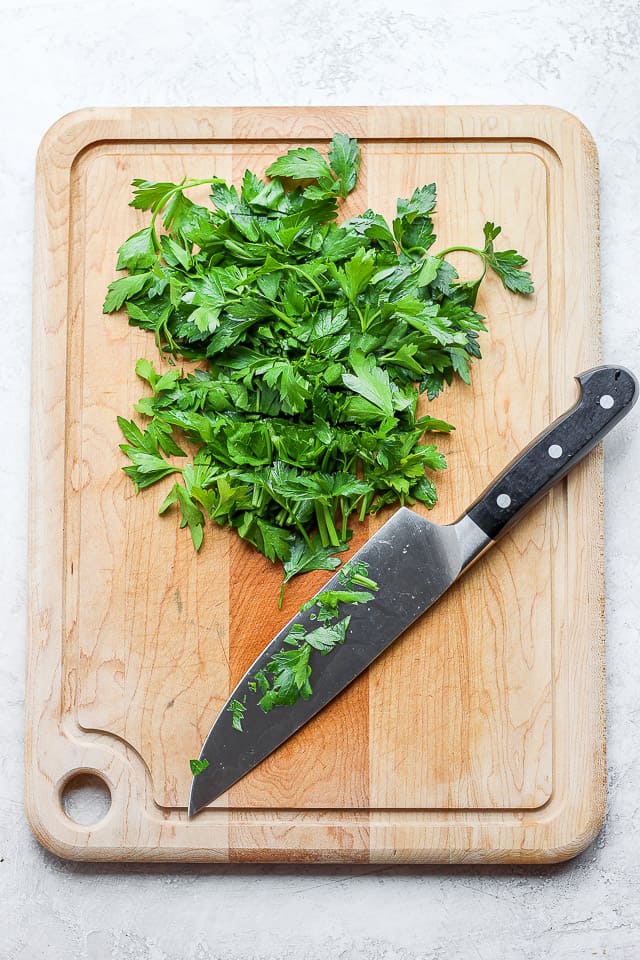
For more cutting tutorials, check out:
- How to Trim Brussel Sprouts
- How to Cut a Tomato
- How to Properly Cut an Onion
- How to Cut an Avocado
- How to Cut a Head of Lettuce
- How to Cut Cauliflower into Florets
- How to Cut a Melon
- How to Cut a Kiwi
If you’ve found this cooking resource for How to Cut Parsley helpful or if you’ve tried any recipe on FeelGoodFoodie, then don’t forget to rate the recipe and leave me a comment below! I would love to hear about your experience with this technique. And if you snapped some shots of it, share it with me on Instagram so I can repost on my stories!

How to Chop Parsley
Ingredients
- 1 bunch parsley
Instructions
- Place the parsley in a colander and wash with cold water for a few minutes to loosen and remove any dirt. Dry on paper towels or in a salad spinner.
- Decide how much parsley you want to use and store the remainder in a mason jar filled with water. You want to place the parsley stems down into the water and cover with a clear plastic bag. You can place a rubber band around the bag to keep the bag in place. Store in the refrigerator for up to 2 weeks.
- For the remaining parsley you’ll use in your recipe, line up the parsley bunch together and use a sharp knife to cut off where the stems start to look thicker and larger.
- Keeping the tip of the knife on the cutting board, with your palm on the top of the front of the knife and the other on the handle, begin chopping the parsley with fast up and down motion.
- Continue until the parsley is well chopped, store in a lidded container with a damp paper towel underneath, and use within 5 days.
Notes
- Storage Method 1: Place like a bunch of flowers in a glass jar covered by a plastic or silicon bag. You can trim the bottom of the sticks and be sure to change out the water every 3-5 days.
- Storage Method 2: Roll the parsley in a clean, damp (not wet!) paper towel, then roll the whole bundle into a plastic or silicon bag.
Nutrition
Nutrition information provided is an estimate. It will vary based on cooking method and specific ingredients used.
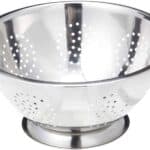
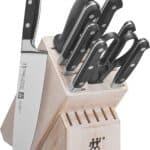
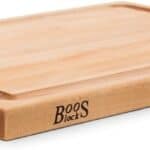
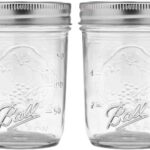
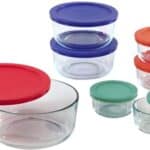
I so much appreciate your consistent simple and healthful approach to all your recipes.
Timely of course, how to use fresh herbs so l can go into summer confidently to maximize using and stori g y Great summer!
Thank so much, Stu! Hope you have a great summer!
Terrific info on caring for and chopping parsley! Do you have a cookbook? If not you definitely should!
This is very helpful!! I’m so glad this came up today. I recently commented on your IG that teaching how you chop your ingredients would be helpful because most of the time when I watch your cooking videos all ingredients are usually chopped ready to go. Thanks!!